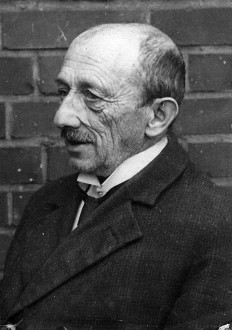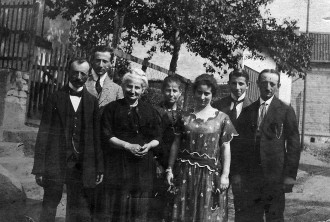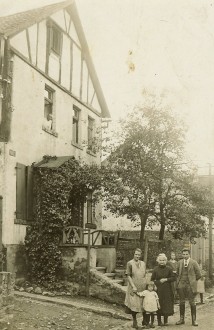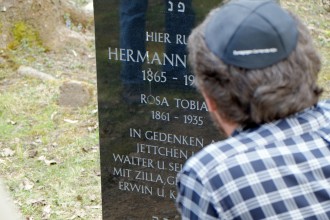
When Hermann was born on June 16, 1865, in Oberdreis, his parents had lost twin daughters only a year ago. Helene and Amalie had died soon after birth. Perhaps his mother Hannchen already suffered from consumption at the time. On March 26, 1866, nine months after Hermann’s birth, she passed away, due to tuberculosis. His father Jacob probably wasn’t able to take care of the boy and gave him to his sister Fanny. She married a butcher from Hamm on Sieg in October 1869. The first wife of Gumbert Herz Leser had passed away in July 1869. They had no children together and Gumbert had no children with Fanny. Perhaps Fanny had worked in his household before they married. Hermann’s father Jacob also married again in August 1869, but we have no further records of his whereabouts.
Hermann learned the butcher’s profession from his fosterfather and eventually took over his business. Gumbert died in 1884, but we don’t know when Fanny passed away. Hermann married Rosa “Röschen” Levy of Schupbach on August 2, 1890. She was four and a half years older than Hermann, born on January 15, 1861. Rosa’s father was a salesman named Jacob Levi (1816-1898), and her mother was Klara Löwenberg (1822-1890). We know about three marriages between the Tobias family of Oberdreis and the Löwenberg family of Schupbach: Klara’s sister Sara “Lisette” married Hermann’s cousin Isaak, and Klara’s grandniece Lilli married Hermann’s first son. Röschen’s younger sister Jettchen Levy moved with her to Hamm. She was a single woman.

Starting in 1891, Hermann appears in the synagogue lists of Hamm. At the time, he was only able to pay 75 pennies for one of the backmost seats. In August 1894, a prestigious new synagogue in Moorish style was solemnly inaugurated in the center of the town, not far from Hermann’s house. About 60 Jewish residents of Hamm, as well as the Jews from Wissen, Betzdorf and the surrounding villages went to this synagogue and buried their dead in the cemetery of Hamm. In 1930, Hermann had worked his way forward and paid 30 Marks for the fourth seat behind the three board members.
The first son of Hermann and Röschen was born on July 31, 1892, and his name was Julius. He became a cattledealer and married Lilli Löwenberg of Schupbach. On August 31, 1893, the second son Gustav was born. He died barely 4 years later on April 6, 1897. Another stillbirth, given the name Hermann, was born in 1896. Their son Hugo, born on May 6, 1897, became a butcher like his father and married Irma Gärtner of Ruppichteroth. Johanna, the only daughter, was born on April 25, 1899. She married Joseph Bramson of Cologne. The last son Walter was born on October 23, 1901. He tried to make his living as a craftsman and married Selma Bähr of Haaren, Paderborn. He was the only child of Hermann and Röschen who didn’t survive the Holocaust.

In 1932, Hermann’s house at 10 Scheidter street, where he used to work and live, was put up for compulsory sale. Times hadn’t been easy since the loss of World War I and it was difficult for many Germans, among them Jewish butchers, to make ends meet. The family’s house was purchased by the local savings bank at an auction, and one year later it was sold to the neighbor Alex Bachenheimer, another Jewish cattle dealer. Hermann, Röschen and Jettchen had to move out and found a new rental at the house of Willy Fischer, a communist landlord, who was the only one in town willing to help. Röschen passed away on September 29, 1935, at the age of 73. She was buried in Hamm, but her gravestone is not existent today.
On the night of November 9 to 10, 1938, during the so called Kristallnacht, the synagogue of Hamm was burned down and destroyed. Many Jewish houses were ransacked. The younger men were attacked and taken into ”protective custody”. The gravestones at the Jewish cemetery were smashed, especially the newer headstones of those who were familiar to the mob. Probably the headstone of Röschen was a victim of that rage. The last families, who didn’t emigrate or move to the bigger cities, finally left Hamm after that incident. It was pretty clear that they were not safe there anymore. Also Hermann and his sister-in-law, Jettchen, packed their things and went to Cologne to the Israelitic Asylum, a large Jewish hospital and senior home. They were lucky to get a room there, because many old people from the countryside tried to flee into the city, but often had no place to go if their children already had emigrated. Most private places were overcrowded with relatives and friends. Julius and Hugo had left for the United States in 1937 and Johanna and her family followed them in September 1938. Maybe she managed to bring Hermann and Jettchen to the Asylum before her departure.

Hermann’s youngest son Walter lived with his in-laws in Haaren in Westfalen, too far to assist his father and his Aunt. Hermann died after a fall at the senior home on September 18, 1940, at the age of 75. He was buried in the Jewish cemetery of Köln-Bocklemünd, at the west end of Cologne, but there was no one left to set a gravestone for him. Nothing but a number on a small concrete block indicated his grave until April 2013, when his great-grandson Robert visited Germany. He finally had a gravestone erected with Hermann’s name on it and those of Röschen, Jettchen, Walter and his wife Selma and those of their children Karl-Heinz, Kurt, Erwin, Gerson and Zilla, to commemorate their history and fate.
Jettchen Levy was deported from Cologne to Theresienstadt in July 1942. After a heavy bombing of the city another hospital had been destroyed and so the Nazis took over the Israelitic Asylum and evacuated all its residents within a few days. They sent them to the overcrowded ghetto of Theresienstadt, where Jettchen died only four months after arrival on November 7, 1942, likely of hunger or disease due to the catastrophic living conditions. She was 78 years old.
In 1945, when U.S. troops came to Hamm, soldiers waited at the church for Sunday mass to be over and then forced people to put all the gravestones that they had thrown down a steep hill behind the cemetery years before back into their place.

Family tree:
Generation 1
- Hermann Tobias (1865-1940) ∞ Rosa Levy (1861-1935) Hamm/Sieg
Generation 2
- Jakob II. Tobias (1833-?) ∞ Knendel „Hannchen” Tobias (1840-1866) Oberdreis/Puderbach
- Jakob Levy (1816-1898) ∞ Klara Löwenberg (1822-1890) Schupbach
Generation 3
- Herz Tobias (1798-1860) ∞ Olisa Herz (1801-1864) Oberdreis/Puderbach
- Jacob I. Tobias (1803-1864) ∞ Malchen Benjamin (1815-1861) Oberdreis/Puderbach
- Heymann Levi ∞ Rifka Katz
- Gumbrich Löwenberg ∞ Lea Josef, Schupbach
Generation 4
- Tobias Herz (1758-1833) ∞ Täubchen Samuel (1774-1860) Oberdreis/Puderbach
- unbekannt
- Tobias Herz (1758-1833) ∞ Täubchen Samuel (1774-1860) Oberdreis/Puderbach
- Herz Benjamin (1795-?) ∞ Beile Aron (1795-1829)
